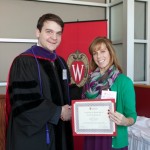By Angela F. Schultz, Marquette University Law School & Ann Zimmerman, University of Wisconsin Law School
Both of Wisconsin’s law schools have created a Pro Bono Society to recognize the pro bono legal services provided their students. Each year, students qualifying for membership in these honorary societies are recognized for their achievement at a special event. In addition, Pro Bono Society members wear an honor cord at graduation and receive special acknowledgement at their law school graduation ceremony.

To qualify for membership in either school’s Pro Bono Society, law students must perform a minimum of 50 hours of pro bono legal services. At Marquette University Law School, special distinction is given to students who achieve 120 hours of pro bono work. The following guidelines are used to determine whether particular volunteer service hours will qualify toward the Pro Bono Society membership requirements:
- Pro bono service must be legal in nature. A primary component of the work must involve the use of legal skills or legal knowledge.
- Pro bono service must be supervised by a licensed attorney.
- Pro bono service must be voluntary. Work for which students receive compensation or academic credit is not eligible for consideration toward the service hour requirements.
- Time spent traveling to and from a volunteer site should not be calculated as service hours.
- A maximum of six hours of direct training may be credited toward service hours.
- Pro bono service must advance equal justice. The primary constituency served should be persons with barriers to accessing justice, or organizations which benefit such individuals. The most direct purpose of pro bono service is the provision of legal assistance at no charge to those who cannot otherwise afford legal counsel.
These guidelines are intended to reinforce the guidance in Wisconsin’s Supreme Court Rule 20:6.1.
Here is what students have to say about participation in pro bono work during law school:
“The experience allowed me to use my legal education to assist people who were not otherwise able to access the legal system. This program is an asset to our law school and it was an honor to take part in it.”
“I believe the pro bono program is beneficial to any student looking to build professional relationships with attorneys and gain valuable work experience. The program gives me the opportunity to improve fundamental skills needed for legal work.”

At the University of Wisconsin Law School, 100 students reported performing 4,000 hours of pro bono activities at 18 different sites. At the Spring 2013 Honors and Awards Ceremony, 38 students were recognized and inducted into the Pro Bono Society, with 2,539 total reported hours from these students.
At Marquette University Law School, 68 percent of the student body participated and collectively performed more than 10,000 hours of pro bono activities. A total of 119 students were inducted into the Pro Bono Society. Among the graduating class, 50 percent had achieved pro bono distinction and wore an honor cord for service at the graduation ceremony.
